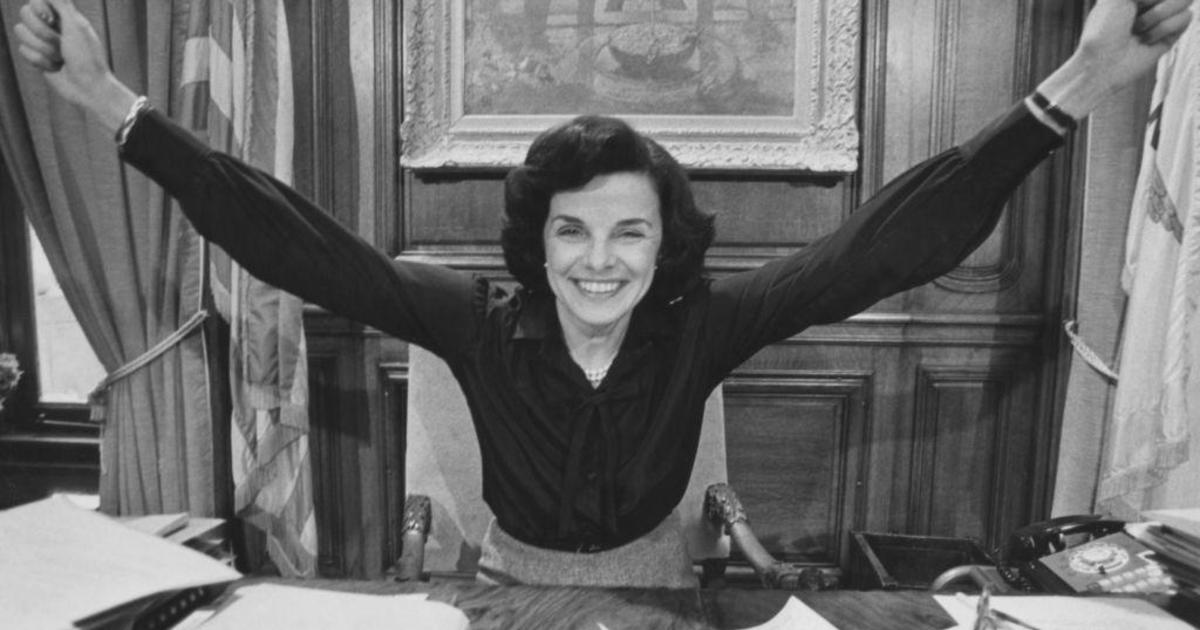
Senator Dianne Feinstein of California died on Friday at the age of 90, according to her office.
Feinstein, a Democrat, was the Senate’s oldest member, having served since 1992. She sat in the Senate longer than any other woman and any California senator.
She died Thursday night at her Washington, D.C., home.
“There are few women who can be called senator, chairman, mayor, wife, mom and grandmother. Senator Feinstein was a force of nature who made an incredible impact on our country and her home state,” her chief of staff James Sauls said in a statement.
Feinstein’s death brings to an end a boundary-pushing political career that stretched more than a half-century and was littered with important legislative accomplishments on subjects ranging from abortion to the environment.
However, in her latter years, Feinstein had more evident health and memory impairments, which caused her to clash with fellow Democrats over her unwillingness to step down.
She intended to retire after her current term expired in January 2025.
Following Feinstein’s passing, Gov. Gavin Newsom will appoint a temporary replacement. Reps. Barbara Lee, Katie Porter, and Adam Schiff are the leading Democrats running for the seat.
Newsom in a statement called Feinstein “a political giant, whose tenacity was matched by her grace.”
“She broke down barriers and glass ceilings, but never lost her belief in the spirit of political cooperation,” he said. “There is simply nobody who possessed the poise, gravitas, and fierceness of Dianne Feinstein.”
“Jennifer and I are deeply saddened by her passing, and we will mourn with her family in this difficult time.”
Senate Majority Leader Chuck Schumer, D-N.Y., said on the chamber floor, “We lost a giant in the Senate.”
“Today, there are 25 women serving in this chamber, and every one of them will admit, they stand on Dianne’s shoulders,” he said.
Rep. Nancy Pelosi of California, the former speaker of the House, grew emotional as she told reporters, “It’s a very sad day for all of us.”
“May she rest in peace,” Pelosi said.
President Joe Biden, who served with Feinstein for decades in the Senate, said in a statement, “She had an immense impact on younger female leaders for whom she generously opened doors.”
“Dianne was tough, sharp, always prepared, and never pulled a punch, but she was also a kind and loyal friend, and that’s what Jill and I will miss the most,” Biden said.
Feinstein, a San Francisco native, paved the way for women in politics as she progressed through the ranks.
After two failed mayoral runs, she was elected president of San Francisco’s Board of Supervisors in 1978, becoming the city’s first female mayor.
Dianne Feinstein ran unsuccessfully for governor in 1990
Later that year, when then-Mayor George Moscone and Harvey Milk, a colleague on the board of supervisors, were slain by former board member Dan White, Feinstein was appointed acting mayor.
Later, Feinstein recounted discovering Milk’s body and looking for a pulse by inserting her finger into a gunshot hole.
Feinstein was the first to inform the press about the murders. A week later, she became San Francisco’s first female mayor.
Her trauma from the murders lingered for decades.
“I never really talk about this,” Feinstein said with a sigh when asked about the killings during a 2017 CNN interview.
Her winning streak continued at the national level.
Feinstein ran unsuccessfully for governor in 1990. However, in 1992, she won a special election to the United States Senate, being the first California woman to do so.
Barbara Boxer was sworn in as a senator a few weeks later, making California the first state to have two women in the Senate at the same time.
Their elections occurred during the “Year of the Woman,” when four Democratic women were elected to the Senate, more than doubling female representation in the legislature.
During her Senate tenure, Feinstein crafted and championed the 1994 assault weapons ban, a historic bill that was the culmination of a career-long struggle to achieve stronger gun control.
The bill was enacted by Congress and signed by then-President Bill Clinton, albeit with significant compromises such as a 10-year sunset provision.
During President George W. Bush’s administration, the ban expired in 2004.
Among other things, she sponsored legislation to protect millions of acres of California desert, campaigned to establish a countrywide AMBER alert network, helped reauthorize the Violence Against Women Act, and fought for the release of a comprehensive report outlining the CIA’s torture tactics.
Feinstein has been seen as a political moderate in her party over her three decades in the Senate.
That reputation made Feinstein extremely popular in the 1990s and 2000s, but much of that popularity has since faded as California’s political hue has evolved toward deeper shades of blue.
Feinstein’s popularity in her final stretch in office was further weakened by a crescendo of suspicion about her mental capacity for the Senate as her centrism fell out of favor.
In April 2022, the San Francisco Chronicle published a damaging story in which unidentified Democratic colleagues of Feinstein expressed concern about her apparent deterioration in mental acuity.
Feinstein defended her capacity to legislate while admitting to having lived through an “extremely painful and distracting” period while her late husband, investor Richard Blum, fought cancer.
Multiple Democrats have already launched campaigns to succeed Feinstein when she announced she would not seek reelection at the conclusion of her term.






